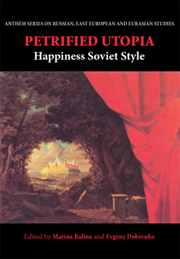Book contents
- Frontmatter
- Contents
- List of Illustrations
- Acknowledgments
- List of Contributors
- Introduction
- Petrified Utopia
- Part One Utopics
- Part Two Realities
- Part Three Locations
- 9 The ‘New Moscow’ and the New ‘Happiness’: Architecture as a Nodal Point in the Stalinist System of Value
- 10 Andrei Platonov's Happy Moscow: Tolstoi, Stalin and the Soviet Self
- 11 ‘But Where is Your Happiness, Alevtina Ivanovna?’: New Debates about Happiness in the Soviet Films of 1956
- 12 Easy on the Heart; or ‘Strength Through Joy’
- Notes
- Index
11 - ‘But Where is Your Happiness, Alevtina Ivanovna?’: New Debates about Happiness in the Soviet Films of 1956
from Part Three - Locations
Published online by Cambridge University Press: 05 March 2012
- Frontmatter
- Contents
- List of Illustrations
- Acknowledgments
- List of Contributors
- Introduction
- Petrified Utopia
- Part One Utopics
- Part Two Realities
- Part Three Locations
- 9 The ‘New Moscow’ and the New ‘Happiness’: Architecture as a Nodal Point in the Stalinist System of Value
- 10 Andrei Platonov's Happy Moscow: Tolstoi, Stalin and the Soviet Self
- 11 ‘But Where is Your Happiness, Alevtina Ivanovna?’: New Debates about Happiness in the Soviet Films of 1956
- 12 Easy on the Heart; or ‘Strength Through Joy’
- Notes
- Index
Summary
The Russian Cinematic Search for Happiness
The search for happiness in Russian film began before the birth of the Soviet Union. Pre-Revolutionary Russian filmmakers were preoccupied with the theme, notably the preeminent Russian director Evgenii Bauer. His characters sought happiness in conventional worldly success in films such as Child of the Big City (Ditia bol'shogo goroda, 1914), but also in ecstatic delusion and selfsacrifice in two films whose titles make explicit reference to happiness, The Happiness of Eternal Night (Schast'e vechnoi nochi, 1915) and his late masterpiece In Pursuit of Happiness (Za schast'em, 1917).
The search continued after the Revolution. One of the most daring and inventive films of the Soviet 1930s bears the one word title Happiness (Schast'e). Made in 1934 by Aleksandr Medvedkin, it tells in allegorical form the tale of the Russian peasant's doomed struggle for happiness. Such is Medvedkin's sense of irony that the film did not attract official approval. Far more consonant with the ideological imperatives of the time was the representation of happiness in the musicals of Grigorii Aleksandrov and Ivan Pyr'ev, in which happiness is encapsulated in songs that are still sung today.
- Type
- Chapter
- Information
- Petrified UtopiaHappiness Soviet Style, pp. 217 - 238Publisher: Anthem PressPrint publication year: 2009
- 1
- Cited by



